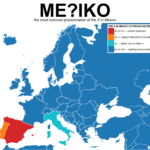Uruk, Iraq
The sorta literal translation from the arabic is so much more beautiful
“From here rose the first written letter, (finding its way) to every point on earth”
I like this version more
Tag: language
I do love when I get a whaler’s journal that has a lot of misspellings. It makes it slower to get through, but in my forever-fascination with New England accents prior to the latter half of the 19th century…when he spells things phonetically you get a better sense of his voice. I always try to preserve them.
In all the things I’ve cobbled together regarding early 19th c New England accents, ranging from the Biglow Papers to children’s speller books (targeting ‘mispronunciations in rural accents’), and whaler journals I can only describe it as like…
A Twangy Brogue. I love it. I’m so fond.
Examples off the top of my head to get a sense.
Catch – Kitch
Certain – Sarten
Oil and boil – Ile, bile
Such – Setch
Lantern – Lant-horn
Coin – Quine
Chair – Cheer
After – Arter
Birthday – bethday
Water – Warter
Exhausted – Exorsted
Get – Git
Sit – Set
Girl – Gal, gel
Chimney – Chimbly
Dirt – Dut
Learn – Larn
Cards – Cairds
Solider – Soger
Nervous – Narvous
Afraid – AfearedTurns of phrase like asking ‘be you happy’ instead of ‘are you happy’, swapping ‘on’ and ‘of’ such as ‘she died of a summer day, and fever was what she died on’ instead of ‘she died on a summer day and fever is what she died of’. ‘Wake snakes’ meaning stirring up trouble. etc. etc. etc. Love all of it.
language
You grow up in a certain way, speaking a certain other language, and you don’t think you’ll ever forget it. It’s there, damn it. It will always be there. This bothers you when you’re young because it’s not the language most people speak. It isn’t the language they speak in the cartoons. You get over this.
It weighs on your mind when you start to lose a native word here and there. It’s the, uh, how do you say it… The word exists, it’s on the tip of your tongue, but it just doesn’t come to you. The impossible begins to happen. Your language begins to atrophy. You wonder why, but you don’t speak it much anymore, do you? You certainly don’t think in that language, not since you were a child. The word for fork. It boggles you, and saddens you a bit. The language you railed against finally gives up on you. It will eventually lose the word for beautiful, or the word for love.
You read the signs and display the subtitles. You pursue feeble attempts at resuscitation.
language
You grow up in a certain way, speaking a certain other language, and you don’t think you’ll ever forget it. It’s there, damn it. It will always be there. This bothers you when you’re young because it’s not the language most people speak. It isn’t the language they speak in the cartoons. You get over this.
It weighs on your mind when you start to lose a native word here and there. It’s the, uh, how do you say it… The word exists, it’s on the tip of your tongue, but it just doesn’t come to you. The impossible begins to happen. Your language begins to atrophy. You wonder why, but you don’t speak it much anymore, do you? You certainly don’t think in that language, not since you were a child. The word for fork. It boggles you, and saddens you a bit. The language you railed against finally gives up on you. It will eventually lose the word for beautiful, or the word for love.
You read the signs and display the subtitles. You pursue feeble attempts at resuscitation.

